Like the ancient capital still almost completely preserved until now, Hue represents the link between the past and the present. It is the place where the Nguyen dynasty – the last feudal court and also the most complete court in the history of our country chose to be the place of reign.
Due to this factor, the ceremonies and rituals here are considered to be the ritual standards of the feudal period of Vietnam, especially the ritual of the celebration of Tet – the most important holiday of the year.
We go back in time, learn how the king and his people of the ancient court of Hue celebrated the New Year.
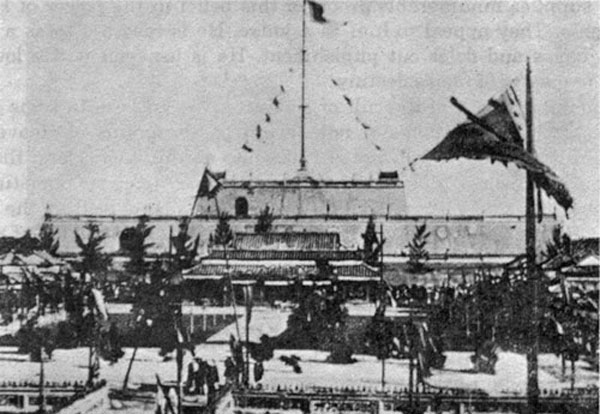 The mast of the citadel of Hue on the day of celebration of Nam Giao in 1935
The mast of the citadel of Hue on the day of celebration of Nam Giao in 1935
As the biggest holiday of the year, Tet in the palace is celebrated very generously. Since the month before the feast, the palace servants had to take care of preparing offerings, decorated with flags all over the palace.
The Tet ceremonies begin in December with Ban Soc (calendar publication), the Nghinh Spring Festival (the welcome spring day), the Phat Phat ceremony (cleaning of the seal and scriptures), the ceremony of enjoying Fête du Tet), Thieu Tieu ceremony (building a tree) … However, the most important holiday remains the first day of the first day of the new year.
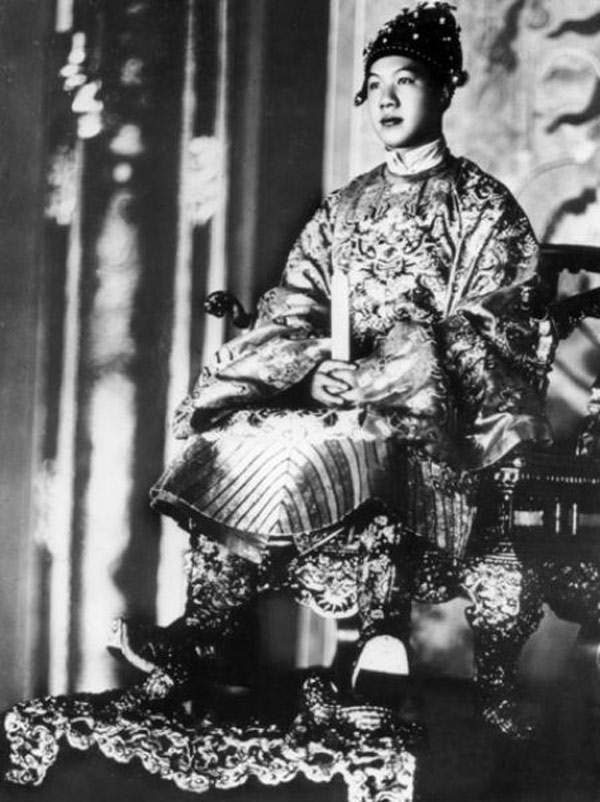 Nam Giao ceremony, the king sat in the palanquin – 1935.
Nam Giao ceremony, the king sat in the palanquin – 1935.
The start of the first day is the royal court ceremony, which is also the most important ceremony. On this day, the drums of the Thai Hoa Palace will be beaten from the Fifth Wing (around 3-5 am).
The ceremony’s golden dragon-shaped flag will be raised up to Ky Dai, surrounded by countless colorful flags and decorated festivals in the Dynasty, Ngo Mon Gate and Ky Dai courts.
When the time is right, the king living at Can Thanh Palace will wear his royal family, wear a dragon crown, hold Tran Khue’s hand on the palanquin to travel to Thai Hoa Palace and lead the New Year celebration.
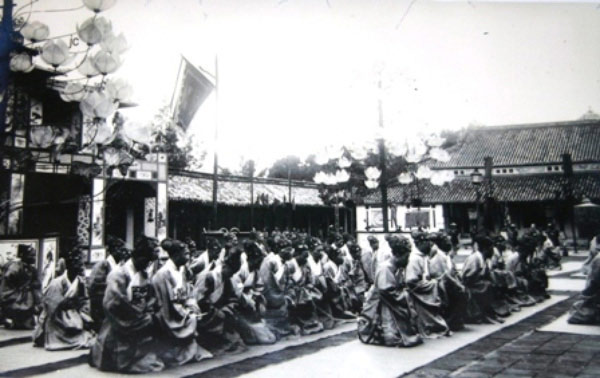 From Ngo Mon Gate, gongs and gongs emerged to welcome the king. The cannon fired 9 explosions.
From Ngo Mon Gate, gongs and gongs emerged to welcome the king. The cannon fired 9 explosions.
The king tied with the pearl belt sat on the throne, below it were the mandarins kneeling in the courtyard. After the five prostrations, together we will offer the leaflets (blessings) and sing in unison “We pray to God for long and for longevity”.
The minister will then read the King’s New Year’s edict, give banquets and gifts to the ranks. After the ceremony, according to the custom of the dignitaries, they will return home. However, during the time of King Bao Dai, due to the absorption of Western culture, the King led his mandarins and Western guests to Can Chanh Palace to invite everyone to a glass of champagne.
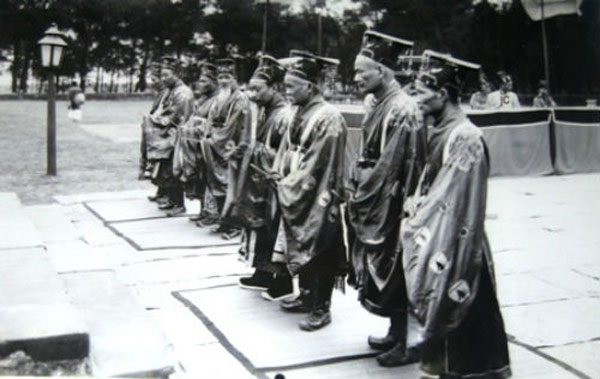 Dignitaries in front of the palace during the Nam Giao ceremony
Dignitaries in front of the palace during the Nam Giao ceremony
On the 1st and 2nd, the king will give banquets and spring bonuses to the princes and princes of the country. New Year’s banquets are also prepared more lavishly and more luxuriously than usual with many “painted seafood” dishes.
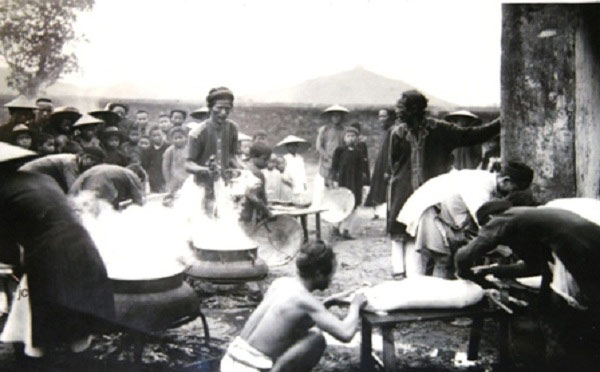 Palace servants prepare the feast
Palace servants prepare the feast
The Tet banquet in the Nguyen dynasty is very varied and rich, from noble dishes to traditional dishes.
The old bibliography of the Classic Society lists many types of dishes including seafood (fish, abalone …), animals (deer, goat, pig, chicken …), rice, sticky rice, tea, jam cake … or high-end dishes such as spring rolls, sea cucumber, bird’s nest.
The dishes of the old courtyard are redesigned.
The king did not eat the banquet with his prince or the mandarins, but ate alone. In King Bao Dai’s time, another change was that he ate with his wife and children.
The banquet at the palace is very large, but usually only takes place for 2 days, followed by the organization of entertainment games and tempting fortune at the start of the year like the game of the head of the lake, the painting of poetry, poetry, chess ….
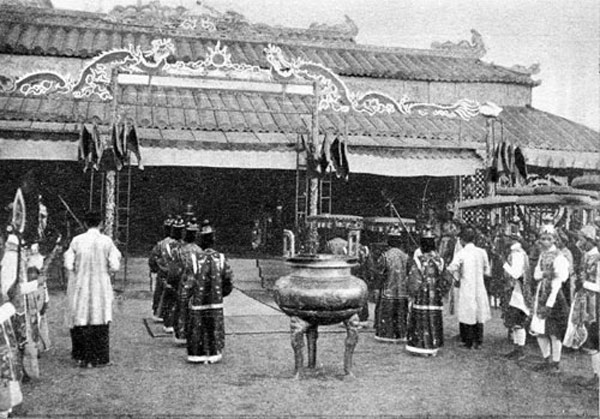
After the 3rd day of the Lunar New Year, the court held a civilization ceremony. The king will go down to the field to plow 3 ways to open the new year harvest, pray that his subjects have good fortune.
In addition to the above ceremonies and games, during the 7 days of Tet, the royal court also holds the Shallow God Procession Ceremony; The ceremony of the king and the queen of spring travels on the Perfume river.
The king is on a dragon boat, the queen takes a phoenix; King acts to congratulate New Year’s topics in the capital. The grand ceremony to end Tet is the worship ceremony (flag ceremony), usually held after the 11th day of Tet.
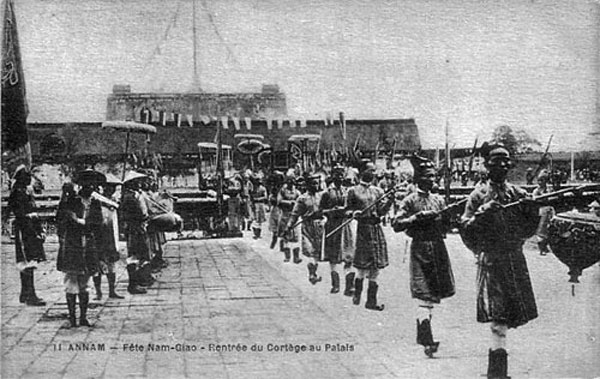 It can be seen that the Tet festival in the Imperial Palace in Hue is not heavy with material pleasure but more emphasis on rituals and rituals.
It can be seen that the Tet festival in the Imperial Palace in Hue is not heavy with material pleasure but more emphasis on rituals and rituals.
Due to this ritualistic character which has been preserved through all generations, present day Hue is also the region with many customs and rituals to welcome Tet in the country.
It represents a precious part of our culture which must be respected and preserved in the face of the trend towards “westernization” which is invading Vietnam today.


